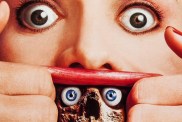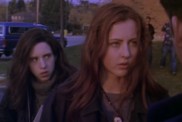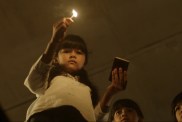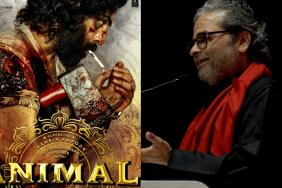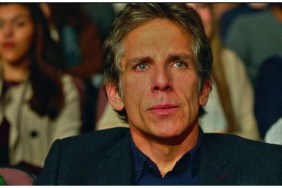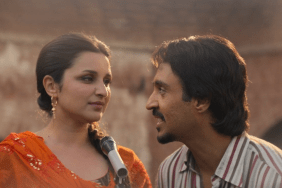Before he became the director responsible for bringing Marvel Comics’ Iron Man to the big screen, Jon Favreau was a filmmaker who came out of the same wave of mid-90s indie filmmakers as Kevin Smith and Wes Anderson due to his script for Swingers, in which he starred with Vince Vaughn. He’d return to direct the 2001 follow-up Made before making a few family-friendly films like Will Ferrell’s Elf and Zathura.
He’s very much returned to his roots with Chef, playing Chef Carl Casper, a once-hot celebrity chef who has fallen into a rut working in a California restaurant owned and micromanaged by Dustin Hoffman. When he gets into an online feud with a food critic, played by Oliver Platt, Casper gets himself fired, so he decides to explore other routes, traveling down to Miami with his son to look into starting up a food truck.
Right now it’s one of this writer’s favorite movies of the year – a real crowd-pleasing movie where Favreau’s skills as a screenwriter, as an actor, and as a director are all brought to the forefront, supported by a great cast that includes Sofia Vergara, Scarlett Johansson, John Leguizamo, Bobby Canavale, newcomer Enjay Anthony (as his son) and a very funny cameo by Robert Downey Jr.
Not only did Chef premiere as the opening night film of this year’s South by SouthWest Film Festival, but it was also a special gala at the Tribeca Film Festival, where it won this year’s Heineken Audience Award, and ComingSoon.net got to speak with Favreau shortly before that.
ComingSoon.net: This movie mixes a lot of things I enjoy like food, music and the internet, which is very much a part of my life. The only thing it doesn’t have is comic books, but you’ve already taken care of that.
Jon Favreau: I got that out of the way. I don’t think this guy I’m playing has ever read a comic book.
CS: What got you started on this? I imagine you must have had some pretty decent catering and food on the last few movies you’ve made so I imagine you became interested from meeting various chefs?
Favreau: Sure, yeah, I did “Dinner for Five.” That was good food. It started off more foodie-ish, and then we didn’t really talk about the food as much, but the environment was always a great environment. I loved being out of town. Also, when you’re recognizable as an entertainment personality, you get reservations to good restaurants, and when somebody takes you out, they’ll throw a little money around usually to impress you at a meeting or something. So you get to eat at great restaurants. But I really like watching the TV shows about chefs. I like reading the books about chefs, so that’s been a big inspiration, especially Anthony Bourdain’s book “Kitchen Confidential.”
CS: Yeah, a great book.
Favreau: That one really to me was exciting. I had heard that they were going to make that a movie. Dave Fincher was talking about doing it with Brad Pitt many years ago. I was so excited to see it, and it just went away. Then, finally, I wanted to make a movie on the scale of “Swingers” again, and the chef world was something really interesting, but then I also wanted to do something about what I have learned about being a dad and about balancing career with family and about balancing pragmatism with passion. The movie business certainly has a lot of that, and so, I could bring some of my insight into a story about this guy, even though he’s quite a bit different than me. I think it overlaps enough that I could make it personal.

CS: I think some of the few criticisms I’ve heard about the movie was from people who say you bring too much to the movie from your own life even though you’re not a chef working on a food truck. And that’s probably why I liked the movie so much.
Favreau: Yeah, I don’t know. To me, it seems like it’s very glaringly different. I mean, it does deal with social networking, but I’ve always been very smart about technology, I think. I’ve never been out of control or tweeting emotionally as the character does. I was an early adopter; I maintained an account for like five years. The same thing, also, I feel like I’ve really balanced out collaborating on bigger movies well and I’m going back to big movies – it’s not like I’m swearing it off. Part of me does feel like once in a while you want to just express yourself, and that’s what this movie allowed me to do without having to collaborate at all. But I really look forward to going back and working on “Jungle Book,” where it’s extremely collaborative. It requires a lot of collaborating with artists and studios, and you’re dealing with Disney IP from the ?60s and Rudyard Kipling from a hundred years ago. I don’t mind the challenge of it, whereas I feel the character that I play, who’s very frustrated by it, was frustrated by social media, was frustrated by critics. Critics as a rule, have been very fair with me, and if you look at my record, I’ve been treated more than fairly. I think the tendency is to try to find it because I’m playing the guy, but I don’t feel like it. But again, maybe they see more than I do in it.
CS: I think that whenever you go after critics in a movie then critics always get a bit uppity. I actually liked M. Night Shyamalan’s “Lady in the Water,” but the film critic gets killed in it and automatically real critics assume he’s going after them.
Favreau: But the critic is pretty cool in this one. At the end of the day, it seems like there’s a critic archetype for food movies, like with “Ratatouille” or anything. You know, if you were doing a puppet show about chefs, one puppet would be the chef, one would be the critic. That’s just how it is. I don’t think the problem was the critic. I think the problem was that he had become complacent, that he’s his own worst enemy, but the critic, of course, points that out, and but what I do find it frustrating if you dig too deeply into what people write on the internet anonymously. I think that’s the part that felt more relatable, that the blogospheres could be very cruel. But I think when you’re first exposed to social networking, you start looking deeply into every nook and cranny of the internet and what they’re saying about you, and that’s very unhealthy. You have to learn to be your own filter, which I do, but my character has not learned to do yet and that’s what drove him over the edge.
CS: Sure, I’m used to it even as a critic myself, because I get a lot of anonymous comments no matter whether I love or hate a movie.
Favreau: Yeah, so you know what I mean. I think it’s the people who jump in and they think, “Hey, this is great,” and then they end up getting burned, you know? You have to understand the rules. You’ve gotta understand what it really is. I think my kids’ generation understands it better. They don’t get offended when they see something. They know it’s like reading a bathroom wall sometimes. You can’t take it too personally.
CS: That’s a good analogy right there, and it’s great having Oliver Platt playing the critic, who I didn’t even know was in the movie until I saw the premiere.
Favreau: Oh yeah, well, his brother is Adam Platt, who is a big food critic for New York, so again, in the interest of making the character seem? the critic doesn’t say much in the beginning at all. He says very little. But to have him to help write the review, the help of him and his brother, and then also to really I think bring the perspective that wasn’t cartoony to what the critic’s underlying motivation was. Especially in the food business, critics take very seriously how much power they have. They can shut a restaurant down. The movie business not so much, maybe once, but not anymore.
CS: Even theater critics get frustrated, because writing a review for a play or musical that’s already sold out shows for months in advance makes it seem like their reviews really don’t make any difference at all.
Favreau: Yeah, but a restaurant, there’s no box office, there’s nothing but how many stars you get. That’s your whole life. People have committed suicide over Michelin stars. So, it’s a much heavier hitter, the critic is, the archetype of the critic in the food business. So that was, again, they allowed me a lot of creative license.
CS: I want to talk about the casting of Carl’s son Percy. Over the years, when I would see a kid in a movie, I’d often groan “Oh, great, there’s going to be a kid in the movie?” but this year I’ve found there’s a lot of great young actors for movies like this, and I’m not sure if you’ve seen Jason Bateman’s “Bad Words,” but that’s another example. Emjay Anthony who plays Percy seems really smart, he feels like he could your son and he’s a big part of the story.
Favreau: Yeah, and to his credit, that storyline could’ve definitely faded to the background if he hadn’t done a great job, but instead, I think it’s the most powerful aspect of the movie, the father/son relationship.

CS: I completely agree.
Favreau: I think the food is a backdrop and the music’s a backdrop, and even the female leads are a bit of a backdrop, but really, it’s all about this kid, and Carl connecting with his kid is what unlocks his passion again, balances his life, and ultimately, restores his career. It was an important role, and I was looking for somebody who’d be extremely natural, not somebody who was polished or somebody who was too experienced. I wanted somebody who had good presence on camera and had good emotional honesty and good naturalism. Then it really looked like he could be? if me and Sofia had a kid, it would look like that, which also I think brings an authenticity to the piece. Then, he was really 10 playing 10, which is rare. Most of the kids you’re seeing playing 10 are really about 12, sometimes 13. I think that also adds an authenticity. I just wanted this film to have a naturalism, that’s why there’s no score. It’s all just needle drops and that’s why honestly it’s a soft R, which is going to haunt us at the box office.
CS: You think so?
Favreau: Soft R’s are rough, because I’d want people to bring kids to this, but it’s hard for a parent to look and see that and to understand that it’s only because the language, which is more than one (F-word).
CS: There’s no violence, no nudity, no sex.
Favreau: No, no, it’s actually really responsible, and I think a good bonding film but you know, for some reason, if you say “f*ck” once, that’s okay, but if a kid hears “f*ck” twice in a movie, it could ruin their lives.
CS: It’s funny how everyone complains about that and no one in the MPAA has ever realized, “Okay, that doesn’t make any sense.”
Favreau: It just further hurts the movie business creatively because what happens is you’re forced to change the language to fit the business model of the studios, so you lose a certain naturalism to storytelling. Or, if you do get an R, they push you to go harder. If you’re going to be an R already, you may as well be “The Hangover,” and you may as well be as shocking as possible, because that’s what delivers the most return. But a soft R like what “Swingers” is or “Made” is, the movies I grew up watching, honestly as studio films, those would all be R movies, and R movies are considered detrimental at the box office unless they’re horror or shock comedy. But I made the movie small enough that I could have that kind of say. Then, what’s happening to those movies is they’re just going to TV now, they’re going to cable. The things that would’ve been movies five or ten years ago are now cable shows. I even comment on it in the movie. The kid’s like, “I hear bad language all the time.” “Where?” “On YouTube.” Like YouTube would be R.
CS: I think a 13 year old could see this, no problem.
Favreau: Yeah, my seven year old sees it and loves it. The fact is they’re exposed to language, and as long as you explain to them what they’re seeing? but to get the kitchen life right, you’ve got to use colorful language, otherwise it’s not accurate.
CS: One thing I want to ask about in the film and I’ve wondered about it both times I’ve seen the movie is that once Carl is sent home by his boss, he starts cooking this really amazing looking meal but then he returns to the restaurant to confront the critic, so why doesn’t he bring the food with him to prove himself?
Favreau: That’s right. That’s what I wanted you to think would happen. That makes the bottom fall out harder because he was just too emotional, but that’s what you’re setting up, those crosscuts. Everybody’s thinking? Honestly, the way I came up with it was from “Game of Thrones.” It’s not a spoiler now, but remember in season one when (SPOILER) gets his head cut off, they are building that and everybody’s expecting somebody to swing in on a rope. The way they crosscut, everything looked like he was about to get saved. I was like, “Oh, this show’s going to really jump the shark, because I don’t believe that he’s going to get saved,” but I knew he was going to get saved. Then, when they cut his head off, I was like, “Holy sh*t.” It was more devastating because it had played into a trope that I had come to expect from fantasy that was gone, so it got me twice as heavy in the gut. I wanted to hit that low point when he embarrasses himself, so, I was trying to build it so you’d think (that). In any other movie, he would come in, see the critic, and get showered with praise and redeem himself?
CS: And the movie would only be 45 minutes long.
Favreau: It would be over. That would’ve been the arc of the movie. So I wanted to start from scratch in the middle at a super low point. I think because one of my qualms with movies is I kinda know everything that’s going to happen in a movie before it happens. It’s so structured that I wanted to play with the form a little bit and throw people.

CS: That’s great. I love when movies surprise me, when movies don’t go the way you’re expecting and the second half of the movie is almost a different movie entirely. You obviously have a few people in this that you’ve worked with before like Scarlett and Robert Downey Jr, so did you have to call in a few favors for this?
Favreau: Sure. Yeah, I mean, nobody got paid what they deserved. Everybody was working for less than what they normally would get, whether it’s in front of or behind the camera. Part of what allowed me to do that is that I was very passionate and it was clearly something that we were going to make a film we would be proud of and we’d be shooting locally, most of it. It was a short shoot. It was less than a month.
CS: In all those locations?
Favreau: Yeah, the whole thing, so it was a very accelerated process, it was a real indie in that sense. I think now people have seen enough of my movies that they know what I do, and it was something they wanted to be a part of, so I was very grateful.
CS: It has a great energy to it. It really has a similar energy to those bigger movies you’ve made and doesn’t feel at all like a lower budget indie movie.
Favreau: No, I got a little more polished than I used to, but hopefully, the sensibility has the freedom of that. The process for me was great; I don’t get to do this. I can’t really think of anything that was negative about it. It was rejuvenating and exciting and it makes me look forward to doing big studio movies again because I had such a good experience. This really, it really got my head straight.
CS: It was like a palate cleanser.
Favreau: It really is. It really is.
CS: So is “The Jungle Book” something that you’re already starting to develop and work on?
Favreau: Yeah, yeah, we’re pretty heavily into pre-production on it right now.
CS: It’s exciting but it’s also interesting that there are other movies based on “The Jungle Book” being developed right now.
Favreau: There’s a Warner Brothers one that’s based, I think more closely on the Kipling than ours, but I think there’ll be enough time between them that they won’t interfere with one another.
CS: Have you started working out how you’re going to do the animals?
Favreau: Yeah, we’re going to have a heavy CG component to the whole thing. It’s really fascinating watching how “Gravity” really took great pains to deceive the audience as to what was CG and what was practical. I think that’s at its best, filmmaking really considers where that line is and how that line moves from scene to scene and shot to shot. So, we’re really doing a lot of research right now in figuring out what the technology has to offer and how to create a bold, exciting experience that justifies remaking something that’s been made into movies before, what technology exists today that makes it worthwhile to do that.
CS: Are you going to shoot it in 3D? I feel like that’s probably the way to go.
Favreau: Yeah, yeah. Whether we actually shoot 3D or convert, unfortunately, it becomes hard to make a compelling case for shooting native, but we’re doing tests now. I’d really like to.
CS: I still feel like the movies that have been shot in 3D have had more to offer although there’s better conversion now than there was four or five years ago.
Favreau: There’s better conversion, and it’s becoming less expensive and better quality and it seems to not impact the box office one way or the other, and there’s much greater expense on the set. So those are some of the things we’re measuring and trying to make a case for, but whether you’re making a little movie or a big movie, the margins are really slim, and people want to do it as efficiently as possible, so we’re trying to figure out how to do it best for a certain purpose.
CS: A while ago your name was kinda thrown around to direct “Star Wars.” Some time in the future, do you want to jump in there and possibly direct one of the spinoffs or do a sequel?
Favreau: I don’t know what they’re up to. I love “Star Wars,” you know, and I can’t remember the last story meeting I’ve been in where “Star Wars” wasn’t referenced. It’s so perfect in so many ways. I can’t wait to see what J.J. comes up with. I know he loves it, he’s always really cherished that franchise, and he grew up with it, as did I. I think seeing what he did with “Star Trek,” where he made his own version of it but still stayed true to what the fans appreciated about the source material, encourages me that he’s going to do something really authentic, but yet original with this.
Chef opens in New York and Los Angeles on Friday, May 9 and then will expand into other areas over the course of May.
Chef
-
Chef

-
Chef

-
Chef

-
Chef

-
Chef

-
Chef

-
Chef

-
Chef

-
Chef

-
Chef

-
Chef

